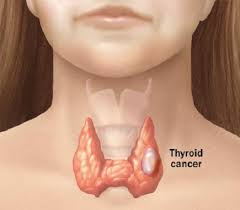- Home
- Editorial
- News
- Practice Guidelines
- Anesthesiology Guidelines
- Cancer Guidelines
- Cardiac Sciences Guidelines
- Critical Care Guidelines
- Dentistry Guidelines
- Dermatology Guidelines
- Diabetes and Endo Guidelines
- Diagnostics Guidelines
- ENT Guidelines
- Featured Practice Guidelines
- Gastroenterology Guidelines
- Geriatrics Guidelines
- Medicine Guidelines
- Nephrology Guidelines
- Neurosciences Guidelines
- Obs and Gynae Guidelines
- Ophthalmology Guidelines
- Orthopaedics Guidelines
- Paediatrics Guidelines
- Psychiatry Guidelines
- Pulmonology Guidelines
- Radiology Guidelines
- Surgery Guidelines
- Urology Guidelines
Novel therapeutic strategy identified for drug-resistant papillary thyroid carcinoma

Perhaps the only thing more devastating than being diagnosed with cancer is to find out after a period of remission that cancer has become drug-resistant and progressed to an incurable state. This is the unfortunate fate for many patients with papillary thyroid carcinoma (PTC), the most common form of thyroid cancer, who are treated with the drug vemurafenib. However, new findings by a Harvard Medical School team suggest that palbociclib, a drug that is FDA-approved to treat advanced breast cancer, may be able to overcome vemurafenib resistance in PTC. Their results were published today on the cover for Oncotarget.
The genetic hallmark of PTC is a specific mutation in the BRAF gene. Patients presenting with the "BRAFV600E" mutation, as it is referred to, are often treated with drugs like vemurafenib, which selectively target this mutation. However, most patients that initially respond to treatment eventually develop drug resistance, allowing cancer to grow and spread.
"Our findings suggest for the first time that a combination drug therapy using vemurafenib and palbociclib represents a novel therapeutic strategy to treat PTC," said the lead author of the study Carmelo Nucera M.D., Ph.D., an assistant professor at Harvard Medical School.
Previous research by this team had shown that in lab-grown vemurafenib-resistant thyroid cancer cells, loss of the P16 gene - which prevents cells from dividing too often - may be linked to the ability of the cancer cells to continue growing even when treated with vemurafenib.
One way P16 controls cell division is by preventing the formation of a protein complex called CDK4/6, which is required for DNA to replicate inside cells. Nucera and his team wondered whether they could prevent treatment resistance by targeting the CDK4/6 complex, in effect mimicking what P16 might do. They identified palbociclib, a CDK4/6 inhibitor that was already FDA approved to treat advanced breast cancer, as a potential candidate.
When the researchers treated cells from vemurafenib-resistant, BRAFV600E-positive PTC patients with a combination of vemurafenib and palbociclib, they found that drugs acted synergistically to induce stronger cell death than when either drug was used alone.
Interestingly, in the course of the study, the researchers also identified that the cells harbored another deleterious genetic aberration that they propose may be a novel secondary mechanism of treatment resistance in cells that are already vemurafenib-resistant. Furthermore, they confirmed that that combined therapy with vemurafenib plus palbociclib results in a very efficient strategy to target PTC cells either with primary or secondary resistance.
"Our results support the proof of concept that this combined therapy can be tested in a clinical trial of patients with metastatic thyroid cancer," said Nucera.

Disclaimer: This site is primarily intended for healthcare professionals. Any content/information on this website does not replace the advice of medical and/or health professionals and should not be construed as medical/diagnostic advice/endorsement or prescription. Use of this site is subject to our terms of use, privacy policy, advertisement policy. © 2020 Minerva Medical Treatment Pvt Ltd